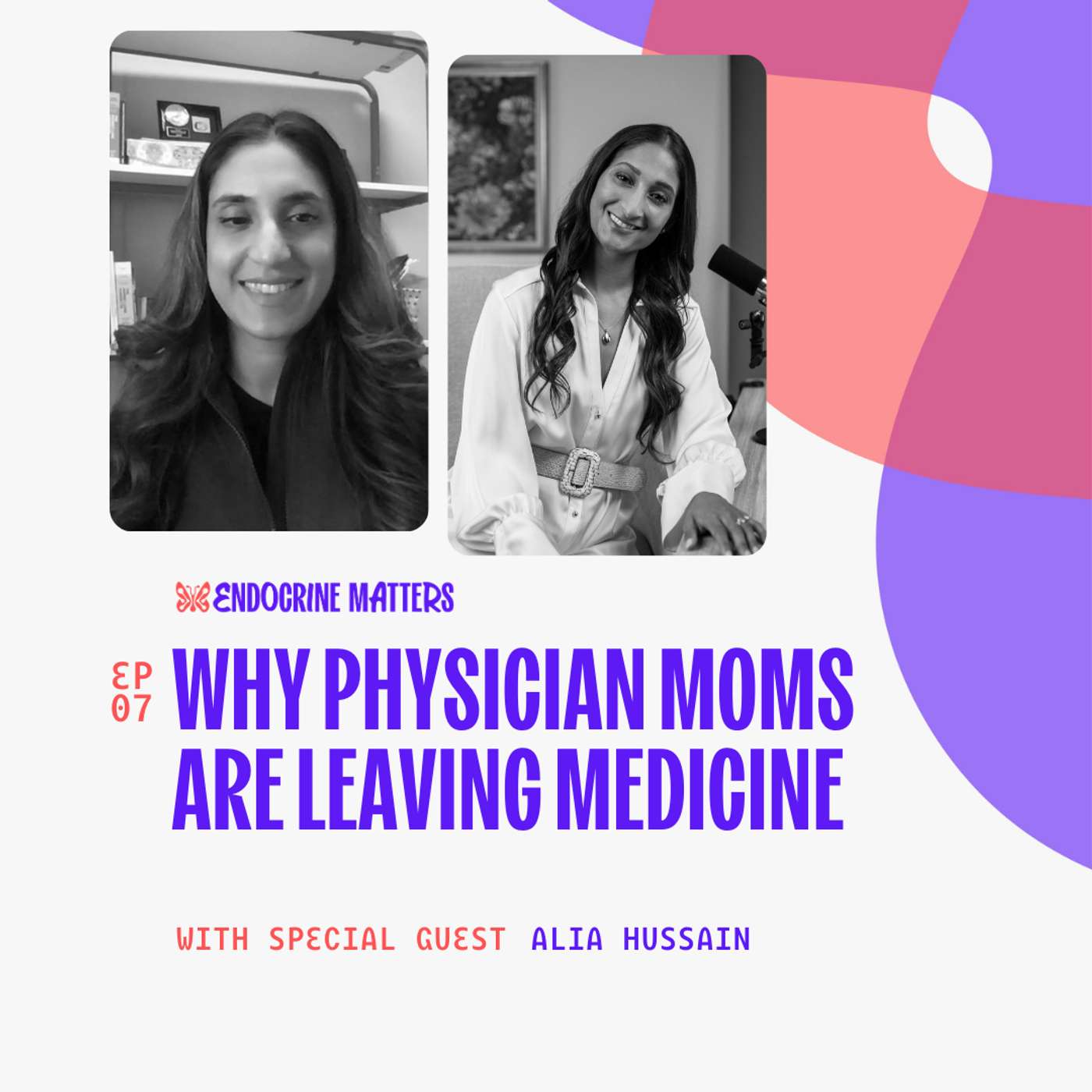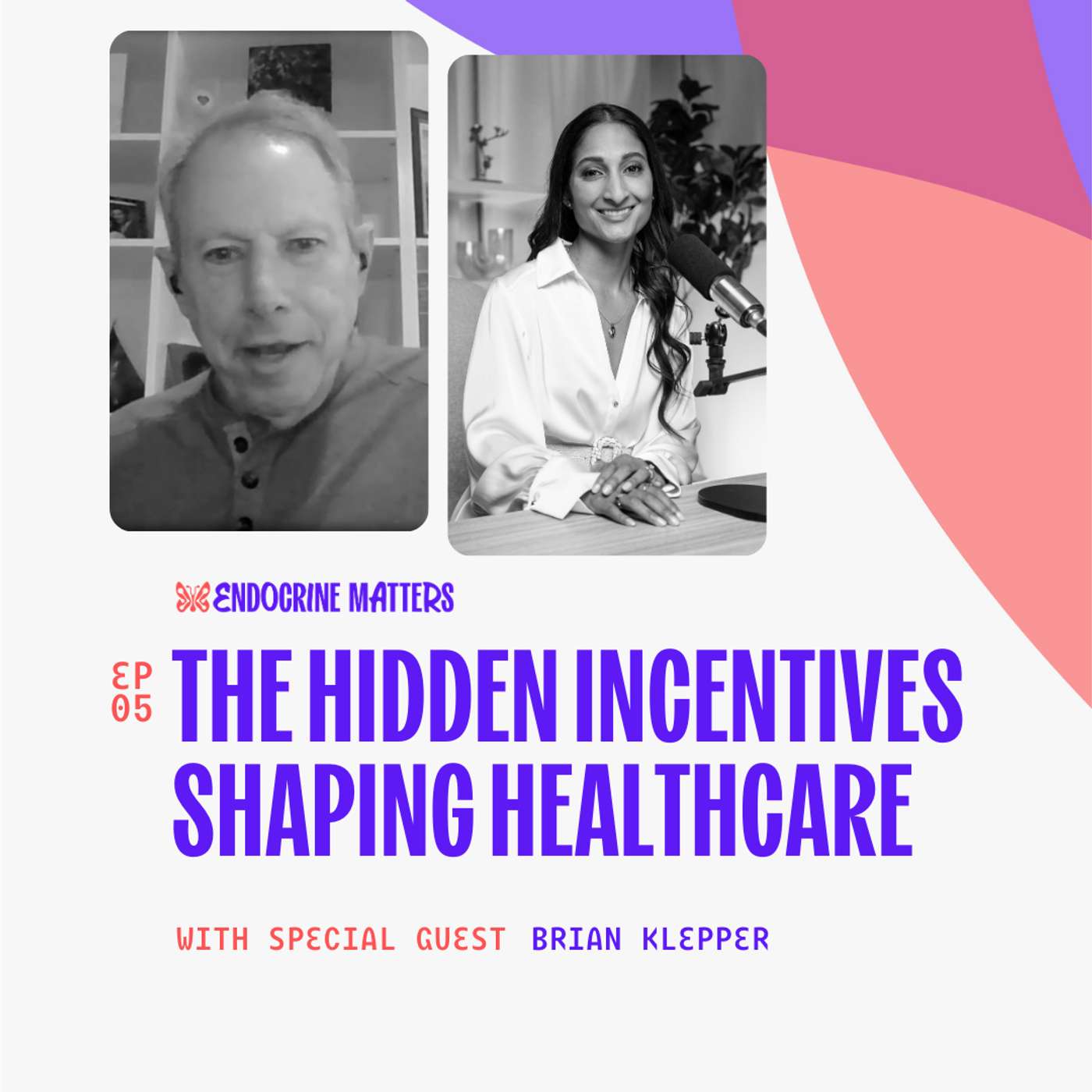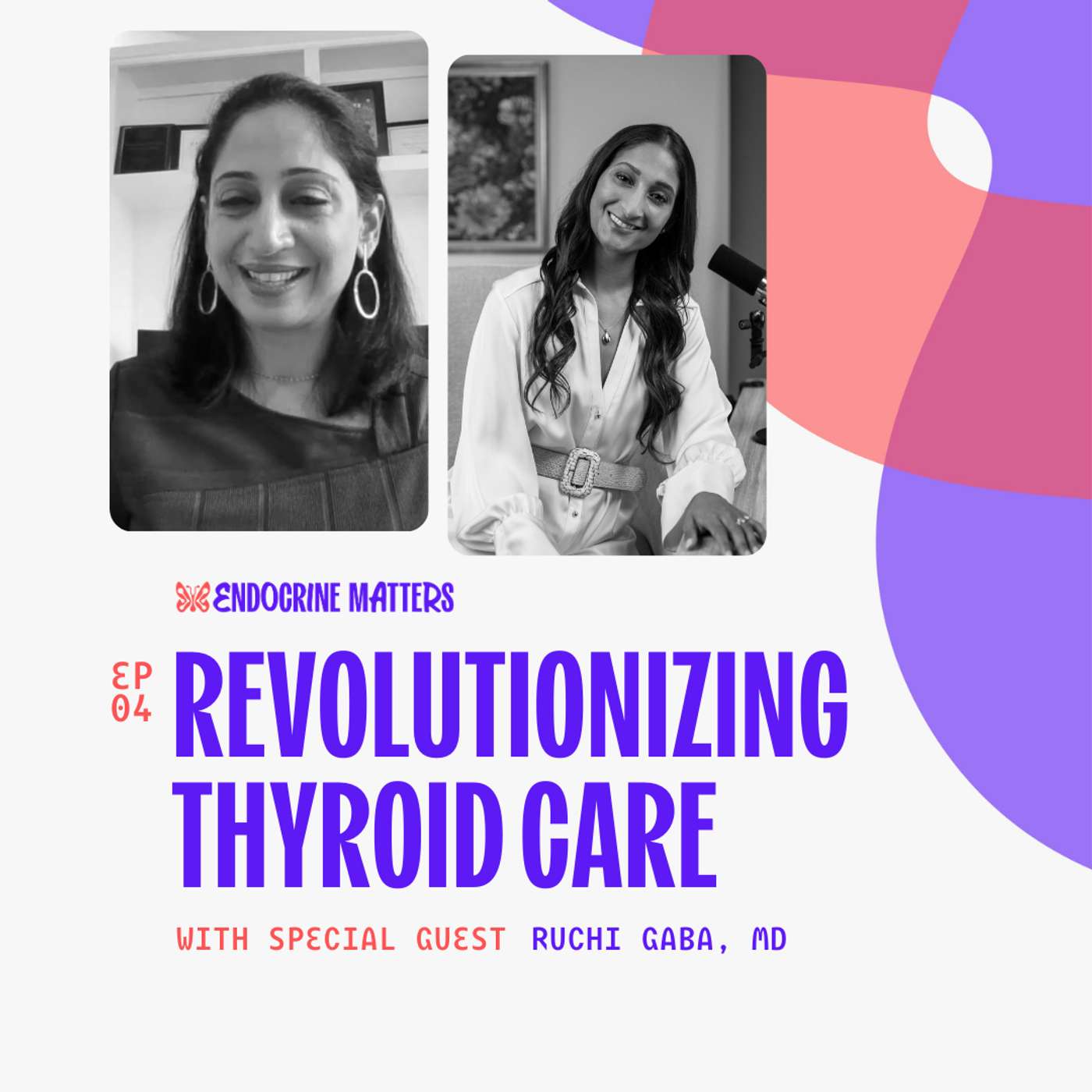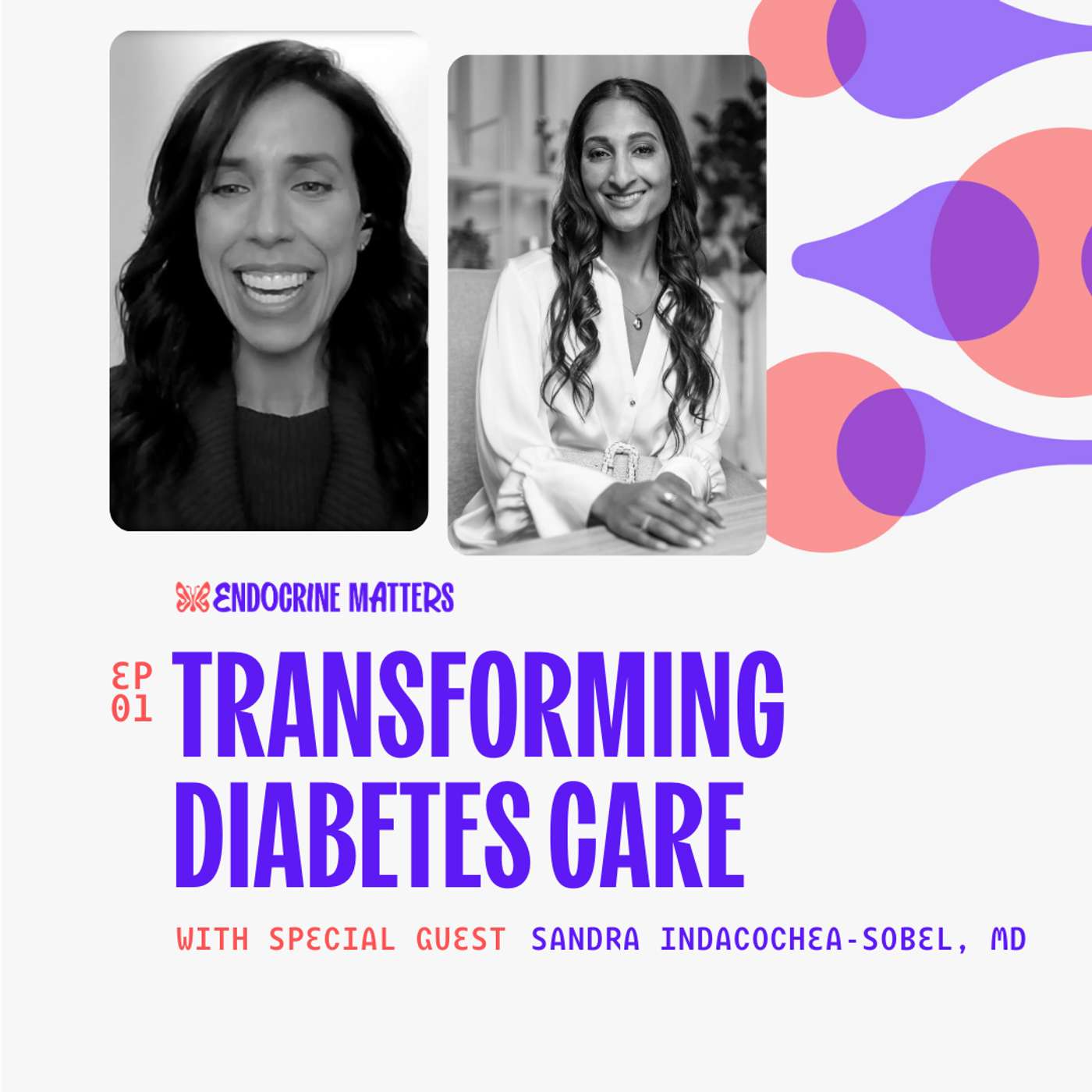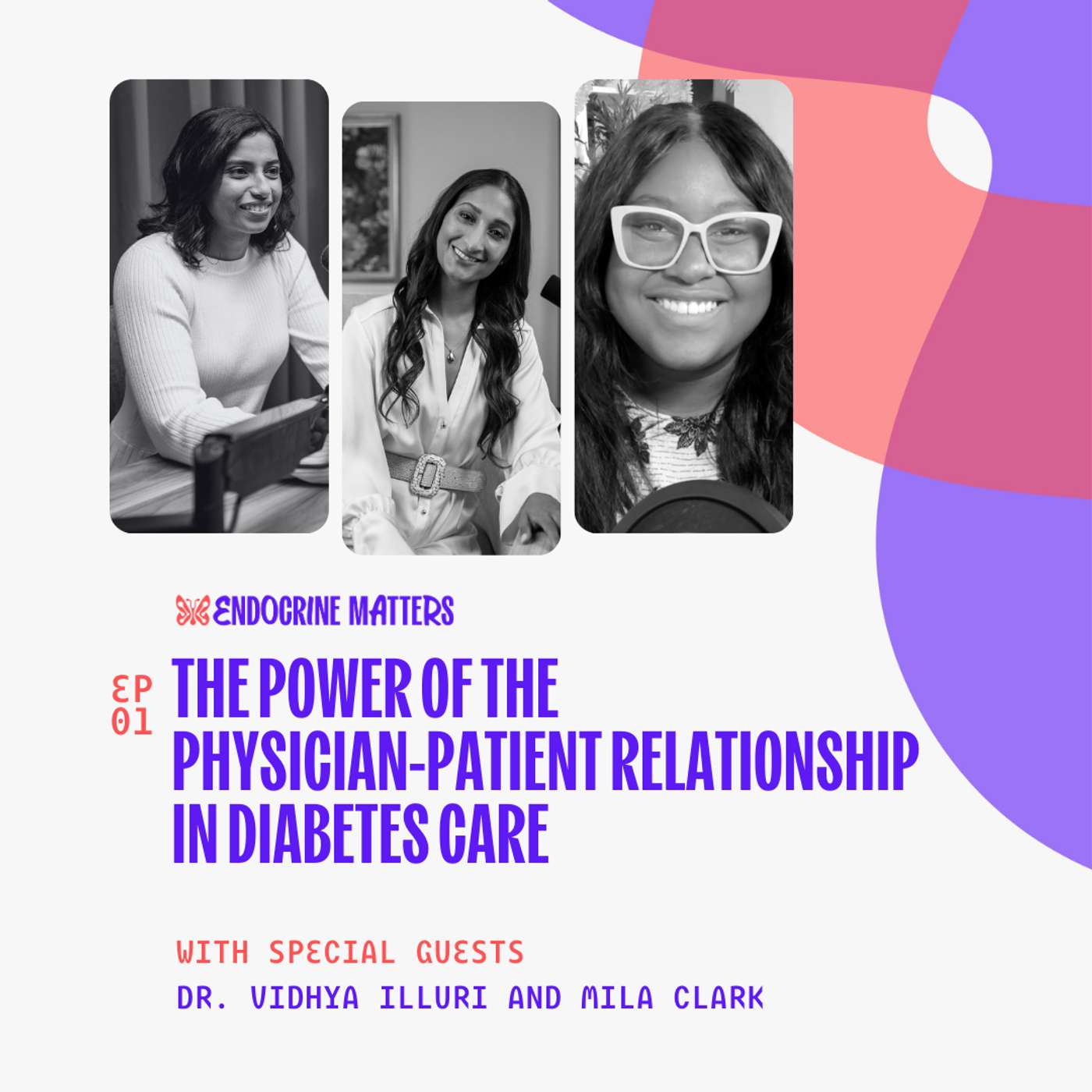Discover Endocrine Matters
Endocrine Matters

Endocrine Matters
Author: Dr. Arti Thangudu
Subscribed: 1Played: 13Subscribe
Share
© 2025 Dr. Arti Thangudu
Description
Endocrine matters empowers women physicians to challenge conventional norms and enhance patient relationships. Through deep discussions, we aim to elevate the specialty and inspire future generations of women physicians, driving meaningful change in hormonal health.
18 Episodes
Reverse
💻 Come see me in clinic: 👉 SacompleteComplete Medicine | Endocrinology Care and Education Sign up for our newsletter: www.sacomplete.com/complete-medicine-blogListen to our podcast, Endocrine Matters: www.sacomplete.com/podcastHave you noticed your blood sugars running high after surgery, illness, or medications like steroids or chemotherapy? In this video, Dr. Arti Thangudu, triple board-certified in Endocrinology, Diabetes & Metabolism, Internal Medicine, and Lifestyle Medicine, brings Dr. Vidhya Illuri and Dr. Munira Mehta on to discuss what post-acute hyperglycemia is, why it happens, and how to manage it safely — without going back and forth to the ER or hospital.💬 You’ll learn:Why stress, illness, surgery, or medications like immunosuppressants and steroids cause high blood sugarsHow post-acute hyperglycemia differs from chronic diabetesWhat to do when your sugars spike — and when to seek medical careHow Complete Medicine provides direct, personalized endocrine care so you can stabilize your blood sugar and recover safely📚 Resources Mentioned in the Video:💡 Learn more about Direct Care Endocrinology: SacompleteHow Direct Specialty Care Can Save You Time, Money, and Sanity | Complete Medicine 🌐 Follow me on other platforms:Instagram: instagram.com/drartithangudu💖 About Dr. Arti Thangudu & This Channel:I’m Dr. Arti Thangudu, a board-certified endocrinologist, diabetes and metabolism specialist, lifestyle medicine physician, and menopause society-certified practitioner. At Complete Medicine, I help high-achieving women with metabolic disease, thyroid issues, and menopause take back control of their health. Subscribe to learn how to manage your metabolism, balance hormones, and live your healthiest, most empowered life.🕒 Topics Covered:IntroductionWhat is Post-Acute HyperglycemiaCauses: Surgery, Illness, Steroids, ChemotherapyWhen to Worry and When to Seek CareHow Complete Medicine Can HelpKey Takeaways⚠️ Disclaimer:This video is for educational purposes only and is not medical advice. Please consult your healthcare provider for personalized care.#postacutehyperglycemia #bloodsugar #endocrinology
In this episode of Endocrine Matters, Dr. Arti Thangudu sits down with Dr. Adrian Chavez, PhD in Nutrition — a leading nutrition scientist, educator, and host of The Nutrition Science Podcast. With his background in exercise science, nutrition, and health promotion, Dr. Chavez has spent over a decade translating complex nutrition research into practical, evidence-based strategies for better health.Together, Dr. Thangudu and Dr. Chavez dive deep into one of the most misunderstood topics in medicine and wellness: What is the right diet for diabetes?Key Points:Why there’s no one-size-fits-all diet for diabetes.How to cut through the noise of nutrition misinformation.The importance of nuance and personalization in metabolic health.How evidence-based nutrition can transform diabetes care — and patient outcomes.Why your individual experience and preferences matter just as much as the science.This conversation is a refreshing reminder that nutrition isn’t about perfection — it’s about progress, context, and understanding what truly works for you.🎧 Listen and Learn:Follow Dr. Adrian Chavez on Instagram: @dr.adrian.chavezTune in to The Nutrition Science Podcast: thenutritionsciencepodcast.com💡 Endocrine Matters is hosted by Dr. Arti Thangudu — endocrinologist, founder of Complete Medicine and HeyHealthy, and advocate for direct specialty care. Through bold, honest conversations, the show challenges the status quo and redefines what great endocrine care looks like. We’d love to see you in our clinic: get started here!
In this candid and wide-ranging conversation, Dr. Arti Thangudu sits down with intuitive consultant Sydney Ashland to explore the emotional, relational, and professional challenges facing high-achieving women—particularly in medicine. They unpack the unseen costs of leadership, cultural expectations around gender roles, and the ways women often internalize unrealistic standards.From navigating relationship dynamics to financial empowerment, Arti and Sydney share personal insights, mindset shifts, and practical strategies for living a more authentic, balanced life. Whether it’s planning shared calendars with a partner or advocating for financial autonomy, this episode offers a deep and compassionate look at what it takes to thrive in today’s world—without losing yourself in the process.Key Takeaways:Marriage is challenging, but also a beautiful adventure.High-achieving women often struggle with self-criticism and unrealistic comparisons.Compartmentalizing can lead to emotional disconnection and burnout.Authenticity in your career can deepen professional relationships.Cultural narratives can create tension for women who are primary earners.Healthy communication and shared planning reduce resentment and decision fatigue.Leadership carries invisible costs—like eroded self-confidence and physical exhaustion.Self-care means refilling your cup, not just checking a box.Financial literacy is essential for reducing stress and gaining freedom.Defining your own values and removing toxic influences is key to fulfillment.Resources & Links:Connect with SydneySydney Ashland CoachingFacebookInstagramLinkedInConnect with Dr. Arti: Instagram: @drartithanguduLinkedIn: Arti Thangudu, MD YouTube: @drartithangudu
In this candid and wide-ranging conversation, Dr. Arti Thangudu sits down with intuitive consultant Sydney Ashland to explore the emotional, relational, and professional challenges facing high-achieving women—particularly in medicine. They unpack the unseen costs of leadership, cultural expectations around gender roles, and the ways women often internalize unrealistic standards.From navigating relationship dynamics to financial empowerment, Arti and Sydney share personal insights, mindset shifts, and practical strategies for living a more authentic, balanced life. Whether it’s planning shared calendars with a partner or advocating for financial autonomy, this episode offers a deep and compassionate look at what it takes to thrive in today’s world—without losing yourself in the process.Key Takeaways:Marriage is challenging, but also a beautiful adventure.High-achieving women often struggle with self-criticism and unrealistic comparisons.Compartmentalizing can lead to emotional disconnection and burnout.Authenticity in your career can deepen professional relationships.Cultural narratives can create tension for women who are primary earners.Healthy communication and shared planning reduce resentment and decision fatigue.Leadership carries invisible costs—like eroded self-confidence and physical exhaustion.Self-care means refilling your cup, not just checking a box.Financial literacy is essential for reducing stress and gaining freedom.Defining your own values and removing toxic influences is key to fulfillment.Resources & Links:Connect with SydneySydney Ashland CoachingFacebookInstagramLinkedInConnect with Dr. Arti: Instagram: @drartithanguduLinkedIn: Arti Thangudu, MD YouTube: @drartithangudu
Telemedicine isn’t just changing the way patients receive care—it’s reshaping the way physicians practice medicine, especially for women in endocrinology. In this episode, Dr. Munira Mehta joins Dr. Arti Thangudu to share how virtual care has created new opportunities for endocrinologists to provide high-quality, patient-centered care while also gaining more autonomy and work-life balance.With 75% of U.S. counties lacking a single endocrinologist, access to specialty care is a significant challenge. Telemedicine is bridging that gap, making expert endocrine care more accessible to patients—while also allowing physicians to practice in a way that aligns with their values, schedules, and personal lives.Dr. Mehta reflects on her journey from traditional practice to telemedicine, navigating non-competes, and redefining her career on her own terms. This conversation explores how telemedicine fosters longer, more meaningful patient interactions, greater flexibility for physicians, and a work culture that prioritizes well-being—especially for women physicians who often face systemic barriers in medicine.Whether you’re a physician, healthcare leader, or just curious about the evolution of medical practice, this episode is an inspiring look at how technology can support better care, stronger physician-patient relationships, and a more sustainable future for medicine.Key Topics & Timestamps:06:30 Improving patient care & physician well-being12:30 Addressing the endocrinology shortage19:30 Overcoming skepticism & building patient trust28:30 Work-life balance & career fulfillment40:00 Gender disparities & systemic challenges in medicine51:00 Rethinking patient access & prevention strategiesEpisode Highlights:The power of telemedicine in improving access to endocrine careHow virtual practice enables more meaningful patient interactionsChallenges women physicians face—from non-competes to work-life integrationThe importance of workplace culture in building fulfilling medical careersWhy flexibility and autonomy matter for physician well-being and patient outcomesHow telemedicine is reshaping the future of endocrinologyResources and Links:Connect with Dr. MehtaLinkedInComplete MedicineSimon Sinek’s book, Leaders Eat LastConnect with Dr. Arti: Instagram: @drartithanguduLinkedIn: Arti Thangudu, MD YouTube: @drartithangudu
Telemedicine isn’t just changing the way patients receive care—it’s reshaping the way physicians practice medicine, especially for women in endocrinology. In this episode, Dr. Munira Mehta joins Dr. Arti Thangudu to share how virtual care has created new opportunities for endocrinologists to provide high-quality, patient-centered care while also gaining more autonomy and work-life balance.With 75% of U.S. counties lacking a single endocrinologist, access to specialty care is a significant challenge. Telemedicine is bridging that gap, making expert endocrine care more accessible to patients—while also allowing physicians to practice in a way that aligns with their values, schedules, and personal lives.Dr. Mehta reflects on her journey from traditional practice to telemedicine, navigating non-competes, and redefining her career on her own terms. This conversation explores how telemedicine fosters longer, more meaningful patient interactions, greater flexibility for physicians, and a work culture that prioritizes well-being—especially for women physicians who often face systemic barriers in medicine.Whether you’re a physician, healthcare leader, or just curious about the evolution of medical practice, this episode is an inspiring look at how technology can support better care, stronger physician-patient relationships, and a more sustainable future for medicine.Key Topics & Timestamps:06:30 Improving patient care & physician well-being12:30 Addressing the endocrinology shortage19:30 Overcoming skepticism & building patient trust28:30 Work-life balance & career fulfillment40:00 Gender disparities & systemic challenges in medicine51:00 Rethinking patient access & prevention strategiesEpisode Highlights:The power of telemedicine in improving access to endocrine careHow virtual practice enables more meaningful patient interactionsChallenges women physicians face—from non-competes to work-life integrationThe importance of workplace culture in building fulfilling medical careersWhy flexibility and autonomy matter for physician well-being and patient outcomesHow telemedicine is reshaping the future of endocrinologyResources and Links:Connect with Dr. MehtaLinkedInComplete MedicineSimon Sinek’s book, Leaders Eat LastConnect with Dr. Arti: Instagram: @drartithanguduLinkedIn: Arti Thangudu, MD YouTube: @drartithangudu
Dr. Francine Kaufman joins the podcast to share her wealth of experience in endocrinology, offering a deep dive into the evolving landscape of the field and the unique challenges women face in medicine. From the shifting demographics of endocrinology to the growing influence of technology in patient care, she reflects on the past, present, and future of the specialty. This conversation unpacks critical issues such as gender disparities in medicine, the impact of feminization on pay and leadership opportunities, and the importance of advocating for oneself in negotiations. Dr. Kaufman also shares her perspective on maintaining clinical practice, fostering strong patient relationships, and navigating career advancement while balancing personal and professional demands. Whether you’re an aspiring endocrinologist or a seasoned physician, this discussion offers invaluable insights into the progress made—and the work still to be done—to create a more equitable and supportive environment for women in medicine.Key Topics & Timestamps:04:05 Experiences in a Male-Dominated Field09:04 Career Trajectory and Technological Advancements13:01 The Importance of Clinical Practice16:01 Building Relationships with Patients19:16 Changes in Endocrinology Over the Decades22:44 The Shift in Patient Ownership29:35 The Feminization of Endocrinology32:45 Gender Parity in Academia39:01 The Impact of Feminization on Pay44:34 Supporting Women in Endocrinology51:22 Finding Meaning in EndocrinologyEpisode Highlights:A Changing Landscape – Endocrinology has seen a shift toward more women entering the profession, reshaping its future.Challenges for Women in Medicine – Work-life balance, negotiation disparities, and increased clinical workloads remain persistent hurdles.Technology’s Impact on Diabetes Care – Innovations have transformed treatment approaches, leading to better patient outcomes.Gender Pay Disparities – Historically, women in endocrinology earned less than their male counterparts, though progress is being made.The Importance of Mentorship – Support systems and mentorship are crucial in advancing women’s careers in medicine.Hospitalists and Changing Care Dynamics – The rise of hospitalists has altered how patient care is managed within hospital settings.Gender Parity in Academia – While progress has been made, true equity in leadership and pay structures is still a work in progress.Job Sharing and Flexibility – Alternative work models like job sharing can create better balance between career and family life.Creating a Supportive Environment – Systemic changes can lead to greater job satisfaction and career longevity.Connect with Dr. Arti: Instagram: @drartithanguduLinkedIn: Arti Thangudu, MD YouTube: @drartithangudu
Dr. Francine Kaufman joins the podcast to share her wealth of experience in endocrinology, offering a deep dive into the evolving landscape of the field and the unique challenges women face in medicine. From the shifting demographics of endocrinology to the growing influence of technology in patient care, she reflects on the past, present, and future of the specialty. This conversation unpacks critical issues such as gender disparities in medicine, the impact of feminization on pay and leadership opportunities, and the importance of advocating for oneself in negotiations. Dr. Kaufman also shares her perspective on maintaining clinical practice, fostering strong patient relationships, and navigating career advancement while balancing personal and professional demands. Whether you’re an aspiring endocrinologist or a seasoned physician, this discussion offers invaluable insights into the progress made—and the work still to be done—to create a more equitable and supportive environment for women in medicine.Key Topics & Timestamps:04:05 Experiences in a Male-Dominated Field09:04 Career Trajectory and Technological Advancements13:01 The Importance of Clinical Practice16:01 Building Relationships with Patients19:16 Changes in Endocrinology Over the Decades22:44 The Shift in Patient Ownership29:35 The Feminization of Endocrinology32:45 Gender Parity in Academia39:01 The Impact of Feminization on Pay44:34 Supporting Women in Endocrinology51:22 Finding Meaning in EndocrinologyEpisode Highlights:A Changing Landscape – Endocrinology has seen a shift toward more women entering the profession, reshaping its future.Challenges for Women in Medicine – Work-life balance, negotiation disparities, and increased clinical workloads remain persistent hurdles.Technology’s Impact on Diabetes Care – Innovations have transformed treatment approaches, leading to better patient outcomes.Gender Pay Disparities – Historically, women in endocrinology earned less than their male counterparts, though progress is being made.The Importance of Mentorship – Support systems and mentorship are crucial in advancing women’s careers in medicine.Hospitalists and Changing Care Dynamics – The rise of hospitalists has altered how patient care is managed within hospital settings.Gender Parity in Academia – While progress has been made, true equity in leadership and pay structures is still a work in progress.Job Sharing and Flexibility – Alternative work models like job sharing can create better balance between career and family life.Creating a Supportive Environment – Systemic changes can lead to greater job satisfaction and career longevity.Connect with Dr. Arti: Instagram: @drartithanguduLinkedIn: Arti Thangudu, MD YouTube: @drartithangudu
The journey of new motherhood is challenging enough, but for physician moms, the demands of medical training and clinical work can make it even harder—especially when it comes to breastfeeding. The cultural and systemic barriers in healthcare often leave women feeling like they have to choose between their careers and their families. But does it have to be this way?In this episode, Dr. Arti Thangudu sits down with Dr. Alia Hussain, a direct care pediatrician and lactation advocate, to discuss the vital need for better maternity leave policies, workplace flexibility, and a culture that truly supports physician moms. As a mother herself, Dr. Hussain has experienced firsthand the struggles of balancing a demanding medical career with raising children. Through her work, she’s helping to change the conversation and offer solutions that keep women thriving in medicine.This conversation is about more than just breastfeeding—it’s about rethinking how we support the people who care for us. If we want a healthier future, we have to invest in keeping talented, compassionate physicians in the workforce.Key Topics & Timestamps:04:46 Importance of Breastfeeding07:31 Breastfeeding Challenges and Solutions20:46 Support for Breastfeeding Moms27:47 Training and Education in Breastfeeding Medicine35:07 Challenges of Pumping at Work37:39 The Impact of Workplace Support38:39 Physician Retention and Motherhood41:16 Advocating for Breastfeeding Rights43:49 The Need for Maternity Leave and Daycare55:59 The Motherhood PenaltyEpisode Highlights:The Reality of Breastfeeding in Medicine – Physician moms face unique challenges, from inadequate maternity leave to the lack of time and space to pump at work.Workplace Culture Needs to Change – Supporting breastfeeding isn’t just about personal choices; it’s about creating an environment that allows women to stay in medicine.The Role of Breastfeeding in Preventive Health – Despite the health benefits for both mom and baby, breastfeeding is often overlooked in our current healthcare model.Retention Crisis in Medicine – 25% of female physicians leave practice or go part-time within six years of finishing training. Without systemic change, we risk losing invaluable members of the workforce.Solutions for a More Supportive Future – From hospital-based childcare to better lactation accommodations, there are actionable steps institutions can take to retain women in medicine.Resources & Links:Connect with Dr. Hussain:LinkedInInstagram“Why Women Leave Medicine” American Medical AssociationResearch by Paula England on the Motherhood PenaltyWhen Companies Support Pumping Breastmilk at Work, Everyone Benefits - Harvard Business Review Association Between Length of Maternity Leave and Breastfeeding Duration in the United States: A Systematic Review - NIH The Economic Benefits of Paid Leave: Fact Sheet - Joint Economic Committee, U.S. Congress Gender-Based Requests for Physician Care - American Family Physician Occupational Feminization and Pay: Assessing Causal Dynamics Using 1950–2000 U.S. Census Data Connect with Dr. Arti: Instagram: @drartithanguduLinkedIn: Arti Thangudu, MD YouTube: @drartithangudu
The journey of new motherhood is challenging enough, but for physician moms, the demands of medical training and clinical work can make it even harder—especially when it comes to breastfeeding. The cultural and systemic barriers in healthcare often leave women feeling like they have to choose between their careers and their families. But does it have to be this way?In this episode, Dr. Arti Thangudu sits down with Dr. Alia Hussain, a direct care pediatrician and lactation advocate, to discuss the vital need for better maternity leave policies, workplace flexibility, and a culture that truly supports physician moms. As a mother herself, Dr. Hussain has experienced firsthand the struggles of balancing a demanding medical career with raising children. Through her work, she’s helping to change the conversation and offer solutions that keep women thriving in medicine.This conversation is about more than just breastfeeding—it’s about rethinking how we support the people who care for us. If we want a healthier future, we have to invest in keeping talented, compassionate physicians in the workforce.Key Topics & Timestamps:04:46 Importance of Breastfeeding07:31 Breastfeeding Challenges and Solutions20:46 Support for Breastfeeding Moms27:47 Training and Education in Breastfeeding Medicine35:07 Challenges of Pumping at Work37:39 The Impact of Workplace Support38:39 Physician Retention and Motherhood41:16 Advocating for Breastfeeding Rights43:49 The Need for Maternity Leave and Daycare55:59 The Motherhood PenaltyEpisode Highlights:The Reality of Breastfeeding in Medicine – Physician moms face unique challenges, from inadequate maternity leave to the lack of time and space to pump at work.Workplace Culture Needs to Change – Supporting breastfeeding isn’t just about personal choices; it’s about creating an environment that allows women to stay in medicine.The Role of Breastfeeding in Preventive Health – Despite the health benefits for both mom and baby, breastfeeding is often overlooked in our current healthcare model.Retention Crisis in Medicine – 25% of female physicians leave practice or go part-time within six years of finishing training. Without systemic change, we risk losing invaluable members of the workforce.Solutions for a More Supportive Future – From hospital-based childcare to better lactation accommodations, there are actionable steps institutions can take to retain women in medicine.Resources & Links:Connect with Dr. Hussain:LinkedInInstagram“Why Women Leave Medicine” American Medical AssociationResearch by Paula England on the Motherhood PenaltyWhen Companies Support Pumping Breastmilk at Work, Everyone Benefits - Harvard Business Review Association Between Length of Maternity Leave and Breastfeeding Duration in the United States: A Systematic Review - NIH The Economic Benefits of Paid Leave: Fact Sheet - Joint Economic Committee, U.S. Congress Gender-Based Requests for Physician Care - American Family Physician Occupational Feminization and Pay: Assessing Causal Dynamics Using 1950–2000 U.S. Census Data Connect with Dr. Arti: Instagram: @drartithanguduLinkedIn: Arti Thangudu, MD YouTube: @drartithangudu
Dr. Eric Bricker started his career as a physician, but over time, he found himself drawn into the world of healthcare finance—unpacking the complexities of insurance, drug pricing, and hospital consolidation to help people better understand the system. In this episode, he breaks down how pharmacy benefit managers (PBMs) influence medication costs, why hospital mergers drive prices up, and what physicians can do to be better stewards of their patients’ financial health. We also talk about the power of transparency in healthcare and how both doctors and patients can work together to make more informed, cost-conscious decisions.Key Topics & Timestamps:05:51 Understanding Drug Pricing and Market Dynamics12:00 The Complexity of Copay Cards and Patient Costs18:13 Stewardship in Healthcare: A Physician's Responsibility23:52 Final Thoughts and Resources for Patients and PhysiciansEpisode Highlights:From Physician to Finance Expert – Dr. Bricker shares his journey from clinical practice to healthcare finance, offering a unique perspective on the system.The Complexities of Healthcare Costs – Breaking down how insurance, pharmacy benefit managers (PBMs), and hospital consolidation drive up expenses.Transparency in Healthcare – Why patients and physicians struggle to understand pricing and how greater transparency could lead to better decision-making.The Impact of Drug Pricing – How PBMs and manufacturers influence medication costs, often at the expense of patients.Hospital Mergers & Patient Care – The unintended consequences of consolidation, from rising prices to decreased physician autonomy.The Role of Physicians in Financial Stewardship – Why doctors need to consider the economic impact of their decisions on patients and the healthcare system.Collaboration is Key – How doctors, patients, and policymakers can work together to create a more sustainable and patient-friendly healthcare system.Links & Resources:Connect with Dr. BrickerLinkedInYouTubeDr. Bricker’s AHealthcareZConnect with Dr. Arti: Instagram: @drartithanguduLinkedIn: Arti Thangudu, MD YouTube: @drartithangudu
Dr. Eric Bricker started his career as a physician, but over time, he found himself drawn into the world of healthcare finance—unpacking the complexities of insurance, drug pricing, and hospital consolidation to help people better understand the system. In this episode, he breaks down how pharmacy benefit managers (PBMs) influence medication costs, why hospital mergers drive prices up, and what physicians can do to be better stewards of their patients’ financial health. We also talk about the power of transparency in healthcare and how both doctors and patients can work together to make more informed, cost-conscious decisions.Key Topics & Timestamps:05:51 Understanding Drug Pricing and Market Dynamics12:00 The Complexity of Copay Cards and Patient Costs18:13 Stewardship in Healthcare: A Physician's Responsibility23:52 Final Thoughts and Resources for Patients and PhysiciansEpisode Highlights:From Physician to Finance Expert – Dr. Bricker shares his journey from clinical practice to healthcare finance, offering a unique perspective on the system.The Complexities of Healthcare Costs – Breaking down how insurance, pharmacy benefit managers (PBMs), and hospital consolidation drive up expenses.Transparency in Healthcare – Why patients and physicians struggle to understand pricing and how greater transparency could lead to better decision-making.The Impact of Drug Pricing – How PBMs and manufacturers influence medication costs, often at the expense of patients.Hospital Mergers & Patient Care – The unintended consequences of consolidation, from rising prices to decreased physician autonomy.The Role of Physicians in Financial Stewardship – Why doctors need to consider the economic impact of their decisions on patients and the healthcare system.Collaboration is Key – How doctors, patients, and policymakers can work together to create a more sustainable and patient-friendly healthcare system.Links & Resources:Connect with Dr. BrickerLinkedInYouTubeDr. Bricker’s AHealthcareZConnect with Dr. Arti: Instagram: @drartithanguduLinkedIn: Arti Thangudu, MD YouTube: @drartithangudu
In this episode, Arti sits down with Brian Klepper, a nationally recognized healthcare analyst, strategist, and entrepreneur, to discuss the deep-rooted challenges within the healthcare system. They examine how financial incentives shape care quality, why chronic disease management—particularly for conditions like diabetes—often falls short, and the overlooked role of primary care in improving outcomes.Brian, who advises healthcare organizations and employers on high-performance solutions, shares his perspective on the dysfunction of traditional insurance models and how data-driven approaches can realign incentives to benefit both providers and patients. He and Arti explore the public’s misconceptions about healthcare costs, the hidden barriers preventing physicians from fully understanding their own performance, and why endocrinologists must actively demonstrate their value in patient care.This insightful discussion sheds light on the systemic issues at play and offers a vision for a more effective, patient-centered healthcare system—one where collaboration, transparency, and smart data tracking drive real change.Key Topics & Timestamps:03:00 The State of Chronic Disease Management05:54 Understanding the Healthcare System's Failures09:09 The Role of Data in Patient Care11:58 The Impact of Financial Incentives on Care Quality14:58 The Importance of Primary Care18:02 The Need for Collaboration in Healthcare20:58 Tracking Outcomes and Patient Engagement24:11 The Future of Healthcare Solutions40:49 The Hidden Incentives in Healthcare Systems44:08 Challenges in Traditional Insurance Models48:00 The Perception of Healthcare Costs51:40 The Role of Endocrinology in Patient Care56:55 The Future of Endocrinology as a Specialty01:01:58 Demonstrating Value in Endocrinology01:06:42 The Drive for Change in HealthcareEpisode Highlights: • The Healthcare System is Failing Patients: Chronic disease management, especially for conditions like diabetes, remains inadequate, with only 10% of patients under control. • Financial Incentives Prioritize Profit Over Care: The current system rewards volume over value, limiting patient access to the best treatment options. • Data is Key to Better Outcomes: Tracking patient health metrics can improve care quality, but physicians often lack the time or tools to do so effectively. • Primary Care Must Go Beyond Gatekeeping: Physicians should act as patient advocates, ensuring comprehensive and proactive care rather than simply referring cases. • Collaboration Among Providers Leads to Better Care: A team-based approach improves patient outcomes and efficiency across the system. • Physician-Led Solutions Are Underutilized: Doctor-run companies could transform healthcare delivery, but barriers prevent their widespread adoption. • Endocrinology is Undervalued and Underfunded: Despite its complexity, the specialty faces inadequate reimbursement and limited recognition. • Aligning Incentives Can Drive Meaningful Change: When providers and patients share goals for better outcomes, the healthcare system functions more effectively. • The System Must Prioritize Patient Well-Being: Until structural changes shift focus from financial gain to patient health, achieving sustainable, high-quality care will remain a challenge.Resources & Links:Connect with Brian:LinkedInConnect with Dr. Arti: Instagram: @drartithanguduLinkedIn: Arti Thangudu, MD YouTube: @drartithangudu
In this episode, Dr. Ruchi Gaba, an Associate Professor of Medicine at Baylor College of Medicine, renowned thyroid expert, and thyroid cancer survivor, shares her unique perspective on thyroid care. From her personal journey navigating a missed thyroid cancer diagnosis to her work as the Director of the Thyroid Therapy Center at Baylor, Dr. Gaba highlights the pressing need for empathetic, patient-centered approaches in endocrinology.Tune in to hear Dr. Gaba’s insights into bridging the gap between endocrinologists and their patients, tackling thyroid care challenges, and fostering a collaborative and compassionate approach to endocrinology.Key Topics & Timestamps:3:12 - The Importance of Listening to Patients - How thoughtful listening and empathy transformed Dr. Gaba’s approach to care.6:45 - Challenges in Thyroid Care - Why nonspecific symptoms and a TSH-centric approach can leave patients feeling dismissed.10:30 - Diagnosing Hypothyroidism - Key tests for hypothyroidism: TSH, free T4, and free T3. When additional testing like reverse T3 is necessary.15:20 - The Role of T3 in Treatment - When T3 therapy can benefit hypothyroid patients, and why it’s essential to use it responsibly.21:00 - The Dangers of Overtreatment - Potential complications of unnecessary thyroid hormone therapy, including cardiovascular risks, anxiety, and bone loss.25:40 - Addressing Misinformation - Navigating the challenges of alternative practitioners, supplements, and patient misconceptions.30:55 - Functional Medicine and Patient Support - Acknowledging the value of functional medicine while ensuring evidence-based care.35:10 - Shared Decision-Making and Trust - Building trust through empathy, education, and collaboration with patients.40:00 - Holistic Approaches to Thyroid Care - How lifestyle, nutrition, and referrals to other specialists can complement thyroid treatment.Episode Highlights:Listening to Patients as Whole People: Dr. Gaba discusses how her experience as a thyroid cancer patient reshaped her approach to patient care, emphasizing thoughtful, empathetic listening.Complexities of Thyroid Care: Understanding hypothyroidism, its nuanced symptoms, and why a TSH-centric approach isn’t always enough.Testing and Diagnostics: The role of TSH, free T4, free T3, and when additional tests like reverse T3 may (or may not) be useful.The Role of T3 Therapy: Exploring when and why adding T3 to treatment plans can benefit certain hypothyroid patients.Addressing Misinformation: Challenges posed by alternative practitioners, overemphasis on supplements, and unproven therapies. Dr. Gaba shares strategies for guiding patients through the noise of misinformation.The Importance of Connection: How endocrinologists can rebuild trust with patients by focusing on empathetic listening, patient education, and collaborative decision-making.Dangers of Overtreatment: Potential complications of excessive or unnecessary thyroid hormone therapy, including cardiovascular risks and bone health concerns.Leveraging Functional Medicine Strengths Responsibly: Recognizing the value of nutrition and lifestyle counseling while addressing the lack of standardization in some alternative practices.Resources & Links:Learn more about Dr. Gaba’s work at the Thyroid Therapy Center at Baylor College of MedicineConnect with Dr. Arti: Instagram: @drartithanguduLinkedIn: Arti Thangudu, MD YouTube: @drartithangudu
This episode features Dr. Sandra Sobel, a board-certified endocrinologist, lifestyle medicine specialist, and obesity expert based in Pittsburgh. With a passion for metabolic health, Dr. Sobel shares her journey from practicing in traditional clinical settings to founding her direct care practice, Summon Health, where she delivers comprehensive, patient-centered care.Dr. Sobel also highlights the need for cultural and systemic change in the medical field, encouraging physicians to explore innovative models to better serve their patients.Learn more about Dr. Sandra Sobel and her work at Summon Health and discover how lifestyle interventions can lead to better outcomes for patients living with metabolic diseases.Key Topics & Timestamps:06:30 Challenges in Traditional Practice: How administrative pressures hinder patient care.12:45 Lifestyle Medicine in Endocrinology: The importance of addressing nutrition, sleep, and exercise.20:15 Moving Beyond Diabetes Management: Why focusing on root causes can lead to diabetes remission.27:00 Direct Care Benefits: How personalized care improves patient outcomes.33:45 Barriers in Insurance-Based Systems: Why lifestyle medicine struggles in traditional models.40:10 Personal Health Transformation: Dr. Sobel’s own experience with lifestyle changes.47:15 Advice for Physicians: Encouraging exploration of nontraditional practice models.54:00 Closing Reflections: The critical need for systemic change in healthcare.Episode Highlights: • The limitations of traditional endocrinology practices, including time constraints and administrative pressures. • The role of lifestyle medicine and nutrition in improving metabolic health, diabetes care, and overall patient outcomes. • The lack of formal nutrition training in medical education and its impact on endocrinology practice. • How direct care enables deeper patient relationships, personalized care, and the flexibility to address root causes rather than merely managing symptoms. • The challenges and rewards of transitioning to an alternative practice model, focusing on aligning patient care with professional values.Resources & Links:Follow Dr. SobelLinkedInInstagramhttps://www.summonhealth.com/Connect with Dr. Arti: Instagram: @drartithanguduLinkedIn: Arti Thangudu, MD YouTube: @drartithangudu
In this thought-provoking episode of Endocrine Matters, we are joined by the insightful and compassionate Dr. Wendy Dean to explore the concept of moral injury in healthcare. Dr. Dean is a physician, leader, author, and podcaster whose work has illuminated the emotional and ethical challenges physicians face in today’s healthcare systems. Together, we discuss her groundbreaking book If I Betray These Words, the complexities of moral injury, and actionable ways to reclaim humanity in medicine.Key Topics & Timestamps: • 03:12 Defining moral injury and how it differs from burnout. • 09:46 The systemic factors that perpetuate moral injury in healthcare. • 18:15 Dr. Dean’s personal journey from psychiatry to moral injury advocacy. • 29:03 The impact of hospital consolidation and vertical integration. • 41:27 Patients’ misconceptions about billing and the challenges of transparency. • 54:12 Why direct primary care is a win-win for physicians and patients. • 01:10:45 How physicians can address moral injury and advocate for change. • 01:22:18 The power of collective action and building coalitions in healthcare.Episode Highlights: • Moral Injury vs. Burnout: Burnout suggests exhaustion from the work itself, but moral injury stems from systemic pressures forcing physicians to compromise their ethical commitment to patient care. • The Cost of Healthcare Systems: Hospital consolidation, vertical integration, and profit-driven motives have created barriers to ethical care, leaving physicians struggling to fulfill their oaths. • Direct Care as a Solution: Dr. Dean advocates for direct patient care models, which offer transparency, stronger relationships, and better outcomes for both physicians and patients. • Building Trust in Healthcare: The importance of restoring the physician-patient relationship and challenging the systemic issues that harm both.Resources & Links:https://wendydeanmd.com/ Dr. Dean’s Book: If I Betray These WordsDr. Dean’s organization: Moral Injury of HealthcareMoral Matters Podcast: Explore deeper conversations about moral injury43 CCs Podcast: Healthcare insights with a twist of humor Follow Dr. Dean: LinkedIn: Wendy Dean, MDConnect with Dr. Arti: Instagram: @drartithanguduLinkedIn: Arti Thangudu, MD YouTube: @drartithangudu
In this episode of Endocrine Matters, we delve into the transformative impact of empathy and collaboration in diabetes care. Dr. Vidhya Illuri, an endocrinologist and type 1 diabetes expert, joins diabetes advocate Mila Clark (The Hangry Woman) to discuss Mila’s journey from misdiagnosis to proper treatment, the challenges of navigating healthcare, and how endocrinologists and patients can work together to achieve better outcomes. This episode is a must-listen for anyone navigating the complexities of diabetes care—offering insight, inspiration, and actionable advice for patients, caregivers, and healthcare providers alike.Key Topics & Timestamps: • 01:31 Celebrating women in medicine and their unique contributions. • 09:36 Dr. Illuri’s transition from traditional practice to direct care. • 18:30 Mila’s experience navigating systemic barriers in healthcare. • 31:13 Understanding LADA and its distinction from type 2 diabetes. • 38:28 The importance of empathy and trust in patient care. • 51:00 The critical role of female physicians in fostering compassionate care. • 58:01 Addressing the shortage of endocrinologists and its impact on diabetes management. • 01:18:27 Recognizing and addressing diabetes distress. • 01:22:34 Empowering patients through advocacy and validation.Episode Highlights: • Mila’s Misdiagnosis: Misunderstood for four years, Mila shares how persistence and finding the right physician transformed her care. • Endocrinologists’ Role: Dr. Illuri explains why nuanced, frequent, and patient-centered care is critical for diabetes management. • Women in Medicine: How female physicians, like Dr. Illuri, bring empathy and understanding to improve patient outcomes. • Advocacy Tips: The importance of self-advocacy and how patients can empower themselves to achieve better care.Resources & Links:Follow Mila: @thehangrywoman https://hangrywoman.com/ Follow Dr. Illuri@dr.illuris.pantryHarvard Study that showed patients treated by women doctors had better outcomesExplore Mila’s App: Glucose Guide for diabetes tips, recipes, and coaching.This episode is sponsored by CeQur Simplicity. Connect with Dr. Arti: Instagram: @drartithanguduLinkedIn: Arti Thangudu, MD YouTube: @drartithangudu
Join us for the all new season of the Endocrine Matters Podcast beginning February 5th.Endocrine matters empowers women physicians to challenge conventional norms and enhance patient relationships. Through deep discussions, we aim to elevate the specialty and inspire future generations of women physicians, driving meaningful change in hormonal health.








